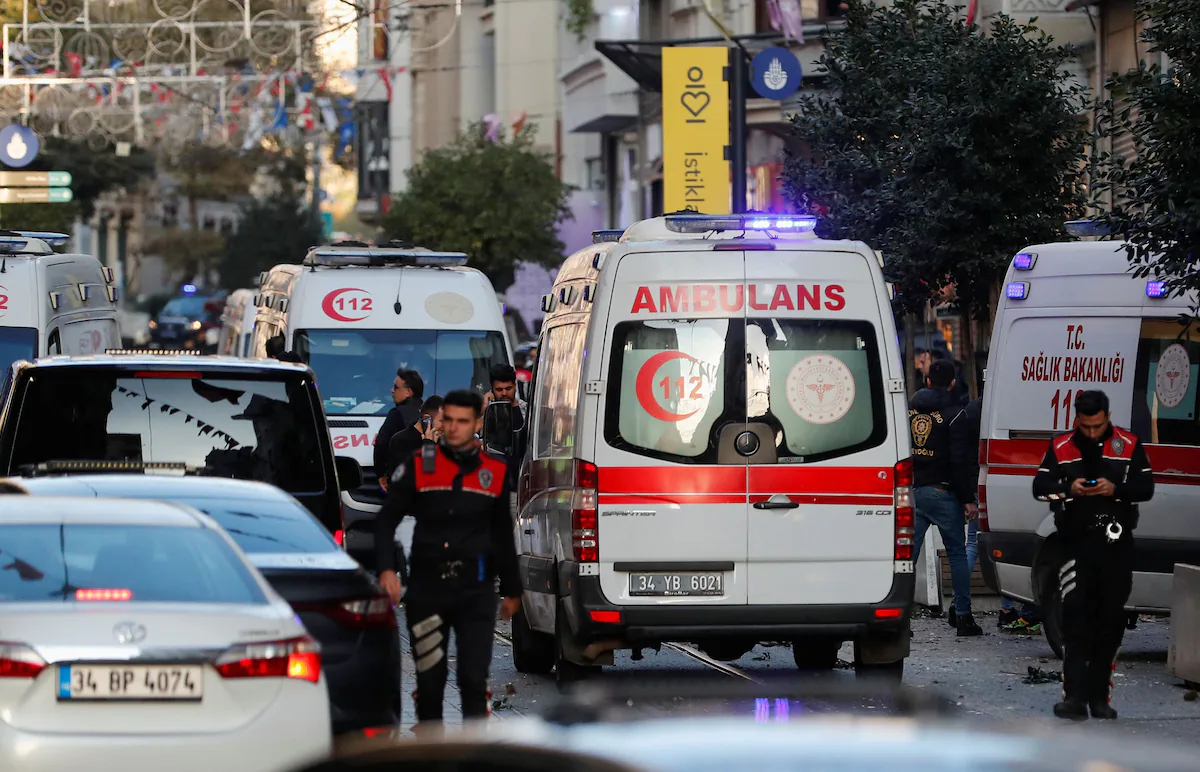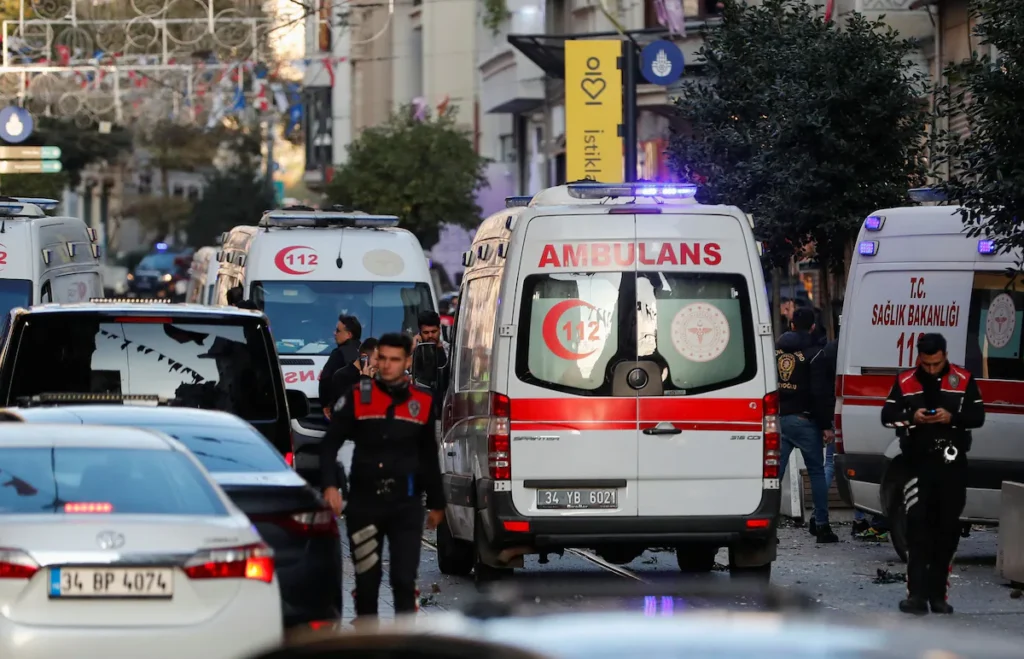Address
304 North Cardinal St.
Dorchester Center, MA 02124
Work Hours
Monday to Friday: 7AM - 7PM
Weekend: 10AM - 5PM
Address
304 North Cardinal St.
Dorchester Center, MA 02124
Work Hours
Monday to Friday: 7AM - 7PM
Weekend: 10AM - 5PM


On 13 November 2022, a bomb exploded on Istanbul’s Istiklal Street, one of the busiest pedestrian thoroughfares located at the heart of the city, killing 6 people and wounding 81 others. Shortly after the attack, the Turkish police arrested a woman named Ahlam al-Bashir, whom the Erdoğan government has since accused of working for the Kurdish People’s Defense Units (YPG) in Syria. On the other hand, the YPG forces, as well as the separatist Kurdistan Worker’s Party (PKK), have flatly denied their involvement in the violent incident.
Despite a number of gaps and inconsistencies, there seems to be a general consensus along the political spectrum (with the major exception of the People’s Democratic Party [HDP]) in accepting the official narrative on the attack, which the Erdoğan government swiftly used as a pretext for commencing an airstrike campaign on 19 November 2022 against the YPG targets located in northern Syria, with a focus on the Kobani and Tel Rifaat regions. With the next general election less than seven months away, Erdoğan will most probably try to instrumentalize the attack and its aftermath to score a number of possible gains. More specifically, he will work towards stirring nationalist feelings in the country and making the issue of “security” as a primary matter of concern for the general electorate. How successful Erdoğan will be in his designs would strongly hinge on how the opposition bloc would react.
Stirring the Nationalist Sentiment
As was the case with similar incidents in the past, the terror attack on Istiklal Street gave President Erdoğan a concrete opportunity to whip up the nationalist sentiment in Turkey and try to divert the electorate’s attention from the pressing economic problems that they have been facing for some time. As is well known at this point, Turkey has been going through a severe economic crisis. The official inflation rate stands at over 85 %, indicating a severe cost of living crisis, while the current account deficit has been rising steadily, making the country’s need for foreign currency ever more urgent. President Recep Tayyip Erdoğan’s drastic U-turns in the international arena vis-à-vis the UAE, Saudi Arabia, and Egypt, as well as his deepening ties with the Russian President Vladimir Putin, have partly been attributed to his need to find foreign cash. Meanwhile, economic problems continue to be polled as the most pressing issue for the Turkish electorate.
Predictably, Erdoğan did lean heavily on a nationalist rhetoric in the aftermath of the attack on Istiklal. In a statement he made immediately after the incident, Erdoğan expressed his willingness to destroy any terrorist organization “at their source,” which was followed by the Turkish security forces undertaking a number of airstrikes in northern Syria. Erdoğan continued his fiery rhetoric during his address to the Justice and Development Party (AKP) members in the parliament on 23 November 2022, expressing his desire to “bulldoze” the terrorists and hinting at the possibility of a ground operation.
Until now, the reactions of the two major powers that have a presence in the region, namely the United States and Russia, against Turkey’s airstrikes have been relatively muted, even though the situation continues to evolve. On 24 November 2022, for instance, the spokesperson for U.S Central Command Colonel Joe Buccino has stated that the Turkish bombing of northern Syria “place U.S troops- as well as the fight against ISIS and the hard-fought stability of the region- at risk.” Meanwhile, Russian special envoy to Syria, Alexandre Lavrentiev, has warned Turkey against undertaking a ground operation in Syria. According to foreign policy expert Arzu Yilmaz, Iran also presents a major obstacle in the way of a further Turkish incursion into regions such as Tel Rifaat.
Seen in this light, an immediate Turkish ground offensive against northern Syria seems to be unlikely. In reality, however, whether Erdoğan can make good on his promises and launch a ground offensive in northern Syria may be beside the point. What may be more important for Erdoğan would be to keep the possibility alive at a discursive level and continue to present northern Syria as a possible source of security threat for the general electorate, which would enable him to present himself as a strong leader for the nationalist voters.
“Security-first” Policies
Closely linked to a rise in nationalist feelings, the second way Erdoğan can instrumentalize the Istanbul attack is to play on electorate’s concern for “security.” The Turkish president is no stranger to this game. In 2015, Erdoğan’s AKP lost its parliamentary majority in June 7 elections, winning 40.8 % of the vote. When a viable government failed to materialize, mainly due to Erdoğan’s efforts to block the process, another round of elections was held on November 1. Between the two elections, however, Turkey has witnessed an unprecedented wave of violent terror attacks that claimed the lives of hundreds of people. Erdoğan capitalized on this extremely tense environment and, playing on the electorate’s fears of security, designated himself (and the AKP) as a strong and familiar option, who would bring back order to the country. His strategy worked. On 1 November 2015, Erdoğan’s AKP won 49.5% of the vote and once again won a parliamentary majority.
Gearing for the election campaign, it would not be surprising to see Erdoğan trying to bring the issue of “security” to the forefront of the political agenda and present himself as the “candidate of stability.” He gave early signs in this vein during a speech he made on 25 November 2022, where he equated winning the next election with avenging the blood of victims who had been killed as a result of the attack on the Istiklal Street.
It would be too simplistic, however, to claim that the 2023 elections would be a repeat of what happened in 2015. One of the main differences between the two is the fact that the Turkish economy is currently in a much worse condition than it was in 2015. Seven years ago, the average inflation in Turkey was around 8%, almost one tenth of what it is today, while the exchange rate for the U.S dollar was around 2.90 Turkish lira (currently it hovers around 18.60 TL). Moreover, the traumatic events of 2015 left indelible marks within the collective memory of Turkish voters, which may make it more difficult than before for Erdoğan to influence them through fear mongering tactics.
Can Erdogan Succeed?
The key factor that would determine the success of Erdoğan’s strategy, however, is the way the opposition bloc responds to his rhetoric. Their initial reactions seem to favor President Erdoğan. The leaders of the “table of six” never really questioned the official narrative on the attack. Nor did they press for stronger explanations on a number of points that obviously needed clarification in determining the main culprit behind the incident. The opposition bloc was also quick to show their support for the operation in northern Syria in an effort to demonstrate that they were as much, if not more, patriotic than their political rivals. Seen in this light, it may be argued that until now, Erdoğan’s rivals continue to lend him a helping hand in reproducing and amplifying his nationalist and “security-first” rhetoric among the electorate. Their adoption of a high-pitched nationalist discourse has also the potential to alienate the Kurdish voter base, which would play a crucial role in the upcoming elections.
For the “table of six” to successfully appeal to the Turkish voters, they need to present an alternative to what Erdoğan has been proposing. What this means is going beyond the nationalist and chauvinistic limits which Erdoğan continues to force upon the opposition and drawing a different path for the country in the post-Erdoğan period. Unless they can manage to do this in a coherent and credible manner, Erdoğan would still have the upper hand in 2023.